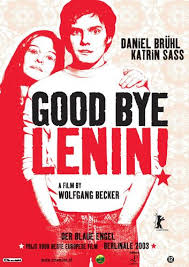Goodbye Lenin!
Screenplay: Bernd Lichtenberg. Co-writer: Wolfgang Becker. Director: W Becker
Daniel Brühl | (Daniel Brühl starred in Ladies in Lavender) | Katrin Sass | Maria Simon | Chulpan Khamatova | Alexander Beyer | Florian Lukas
15 chapters + end titles. 1 hr 56 min (avge 8 mins per chapter). 15.
Evidently an attempt to show clouds disappearing and obsolete propaganda vanishing. But in truth the subtext slowly reveals itself to be a different view of another set of lies.

I'll try to explain the story first. Then the deeper stuff about worldwide propaganda narratives, and their local variations.
The Berlin Wall between parts of Berlin was demolished on the 9 November, 1989. (I quote Wikipedia: it was 96.3 miles long). This event—I remember Roger Waters of Pink Floyd staging a simultaneous TV event—was presented as the result of a public opinion and pressure. Symbolically, a couple of years later, around Christmas 1991, the USSR 'fell', with Gobachev handing over to Yeltsin(!).
 Workers, peasants, and 'intellectuals' (i.e. Jews)
Workers, peasants, and 'intellectuals' (i.e. Jews)On about the 40th 'birthday' of East Germany, Alex was shown joining a protest march, perhaps a 'spontaneous demonstration', against the wall—but police, or Stasi, baton action, including Alex being thrown into a truck, made his mama/mutter collapse with a heart attack. She was in a coma for months—this in fact seems fairly accurate, medically—a long, deep sleep. Incidentally the love interest of Alex was sparked by an 'angelic girl', Lara, a nurse, [Chulpan Khamatova], who showed concern for him.
With the wall down, the 'first free elections' took place. Deutschmarks poured in, westernization took place, things were finally happening, the flat was refurbished, the son worked in satellite aerials, the daughter in Burger King, Germany won at football, 1-0, drab corner stores became gaudy consumer paradises, Coca Cola trucks appeared, and then Christina awoke in her hospital bed. Her son is warned "... she could mix up long term and short term memory ... you must protect her from any kind of excitement" and Alex conceives the scheme of protecting her from evidence of change. And decides to make her bedroom as it was; the old stuff was stored, I think in a cellar, as is more or less needed by the plot. And his scheme took on a life of its own, as he tried reconstructing packaged foods long familiar in the GDR.
Her birthday party arrangements are well filmed; neighbours are clued up re mama's unawareness; a drunk ex-teacher speaks; Young Pioneers sing; a Coca cola banner is hidden away, and comrades smile at each. But she wants to watch TV...
... And Alex doesn't want to shock her. Florian Lukas plays a fellow TV man, a Wessie, who has VCR copies—how clunky the cassettes look now—of old GDR TV news, and equipment to copy tapes. So he can piece together his own tapes. With Alex's Grundig camcorder, and a few props, they assemble their own news programmes: refugees from west Berlin streaming into Berlin, 9th Central Committee in which Honecker resigns, East German cosmonaut, Sigmund Jähn, a real person—perhaps, talking about his view from space, in Soyus 31 in 1978. I'd hoped the 'cosmonaut' would be laughed at as a fraud—with the tantalising prospect of Buzz Aldrin becoming a taxi driver—but no—the pretext to this day is played out—see Wikipedia. This was the point at which I understood the film was itself part of the propaganda construction.
The movie includes quite a bit of Lenin imagery. Lenin was at one time reputed to have more images than any other person, though I'd guess Stalin and Mao exceeded this record. There was an echo of La Dolce Vita, in which the top half of a Lenin casting was moved by helicopter. In 1900 Russia was full of icons; now they have almost gone. And an insecure bust of Marx. Displaced by an IKEA, and car sales being negotiated—Christiane was pleased not to have to wait three years or her Trabant. When Christiane finally got up, and went out rather unsteadily, for the first time since her collapse and coma, that's what she saw. I have to say I think the scriptwriter ran out of steam; too few words near the end.
And more: worthless paper money, Berlin flats being freer when some Berliners moved out to Hungary, the family's father living in Wannsee (home of a Jewish document used to make money—see Wikipedia who still push this fraud), his letters hidden behind a wall partition, the biggest mistake of her life—she just couldn't go west, presumably as it was 'capitalist': "Did your husband discuss leaving the country? Has he contacts in the capitalist world?"; her ashes scattered to the winds.
I recommend the film to people in the West who are awake to the issue of Jewish propaganda. There are parallel endlessly-echoed slogans (democratic, free, socialism, liberating, free speech, pioneer, individual, free speech, hate) that many people can now see through.
Taking a long view, there are (sigh) many still-censored topics: Germany is still occupied; it has a pseudo-Constitution foisted on it; Jews control the banks and education; the Holohoax lie extorts vast sums from them; the mass expulsions from further east barely get a mention; the mass rapes after WW2 are still unacknowledged; the book burnings, torture rooms, thefts of everything from patents to factories not hinted at. Evidence of the Ministry for State Security—Stasi— Volkspolizei, Combat Groups, and Free German Youth (FDJ) are still more or less banned. The mass killings and replacement by Turks and Muslims are not mentioned. The film hinted at killings in Vietnam and Madagascar, and to this day Germans participate in wars, taking orders from world Jewry.
If you watch this, reflect on its twists and turns, and the continued deception by the BBC and Bavaria Film. And by the Jews of the world.
©Rae West 27 Nov 2019